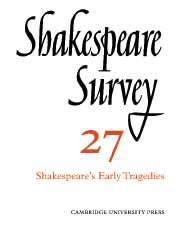Book contents
- Frontmatter
- Shakespeare’s Earliest Tragedies: ‘Titus Andronicus’ and ‘Romeo and Juliet’
- The Aesthetics of Mutilation in ‘Titus Andronicus’
- The Motif of Psychic Division in ‘Richard III’
- The Antic Disposition of Richard II
- The Prince of Denmark and Claudius’s Court
- ‘Hamlet’ and the ‘Moriae Encomium’
- The Relation of Henry V to Tamburlaine
- Shakespeare and the Puritan Dynamic
- Equity, ‘The Merchant of Venice’ and William Lambarde
- ‘Love’s Labour’s Won’ and the Occasion of ‘Much Ado’
- The Date and Production of ‘Timon’ Reconsidered
- Shakespeare, Her Majesty’s Players and Pembroke’s Men
- Judi dench talks to Gareth Lloyd Evans
- Shakespeare Straight and Crooked: A Review of the 1973 Season at Stratford
- The Year's Contributions to Shakespearian Study 1 Critical Studies
- 2 Shakespeare’s Life, Times, and Stage
- 3 Textual Studies
- Index
- Plate section
The Motif of Psychic Division in ‘Richard III’
Published online by Cambridge University Press: 28 March 2007
- Frontmatter
- Shakespeare’s Earliest Tragedies: ‘Titus Andronicus’ and ‘Romeo and Juliet’
- The Aesthetics of Mutilation in ‘Titus Andronicus’
- The Motif of Psychic Division in ‘Richard III’
- The Antic Disposition of Richard II
- The Prince of Denmark and Claudius’s Court
- ‘Hamlet’ and the ‘Moriae Encomium’
- The Relation of Henry V to Tamburlaine
- Shakespeare and the Puritan Dynamic
- Equity, ‘The Merchant of Venice’ and William Lambarde
- ‘Love’s Labour’s Won’ and the Occasion of ‘Much Ado’
- The Date and Production of ‘Timon’ Reconsidered
- Shakespeare, Her Majesty’s Players and Pembroke’s Men
- Judi dench talks to Gareth Lloyd Evans
- Shakespeare Straight and Crooked: A Review of the 1973 Season at Stratford
- The Year's Contributions to Shakespearian Study 1 Critical Studies
- 2 Shakespeare’s Life, Times, and Stage
- 3 Textual Studies
- Index
- Plate section
Summary
Generally speaking, Richard III carries on the theme of guilt and retribution that in one way or another links eight of Shakespeare’s history plays, and concludes the series with the theme of order restored. Motivated by a totally unconscionable ambition for power, the protagonist intensifies the bloody disorder which has plagued England since the deposition of Richard II until he becomes subject to retribution himself at the hands of Richmond, whose success at Bosworth Field is the prelude to peace and unity in England. The deposition of Richard II had led to a division between the houses of York and Lancaster, and this division was responsible for the moral chaos that afflicted England during the Wars of the Roses. When, in Richard II, Carlyle protests against the deposition and prophesies its effect—
Oh, if you raise this house against this house,
It will the woefullest division prove
That ever fell upon this cursed earth
(iv,i, 145-7)-he is, in effect, partially echoing or anticipating Richmond's choric statement at the end of Richard III that the marriage of himself and Elizabeth, 'the true succeeders of each royal house', would bring an end to the unnatural division of brother and brother, and father and son. 'The fair conjunction' of 'the white rose and the red' would, he asserted, unify all that 'divided York and Lancaster, / Divided in their dire division' (v, v, 19, 20, 27-8).
- Type
- Chapter
- Information
- Shakespeare Survey , pp. 21 - 32Publisher: Cambridge University PressPrint publication year: 1974
- 1
- Cited by

